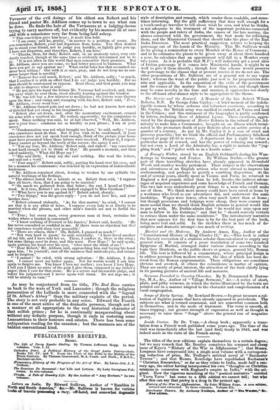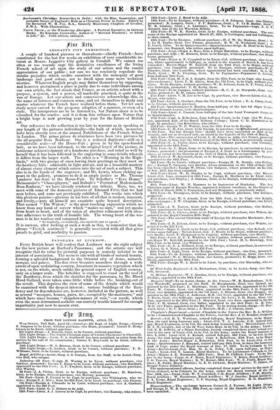PUBLICATIONS RECEIVED.
Boors.
The Life of Percy Bysshe Shelley. By Thomas Jefferson Hogg. In four volumes. Vole. 1. II.
Cathedra Petri. A Political History of the Great Latin Patriarchate. Books III. IV. and V. From the Close of the Fifth to the Middle of the Ninth Century. By Thomas Greenwood, M.A. Camb. and Bluth., F.R.S.L., Barrister-at-law.
Elementary History of the Progress of the Art of War, By Lieut.-Col. J. J. Graham.
The Countess De Bonneval : her Life and Letters. By Lady Georgian& Ful- lerton. In two volumes.
Ursula. A Tale of Country Life. By the Author of " Amy Ilerbert." In two volumes.
Letters on India. By Edward Sullivan, Author of "Rambles in North and South America," &c.—Mr. Sullivan is known for various books of travels possessing a racy, off-hand, and somewhat dogmatic style of description and remark, which render them readable, and some- times informing. But the glib sufficiency that does well enough for a a touch-and-go traveller to tell about what he sees, and what he thinks, is not adequate to the treatment of the important problems connected with the people and rulers of India, the causes of the late mutiny, the abuses connected with the government, the best mode for reforming them, and the Ministerial Council that should take the place of the East India Directors. The most practical suggestion relates to keeping the patronage out of the hands of the Ministry. This Mr. Sullivan would do by giving a nomination to every Member of the House of Commons ; and as he estimates the places to be given away at about three hundred a year, he calculates that an appointment will fall to a Member every two years. As it is probable that M.P.'s will indirectly get a good slice of Indian patronage if it comes into Ministerial hands, it might be as well to give it them directly ; though how this scheme would preserve the patronage to the classes that at present receive it we do not see. The other propositions of Mr. Sullivan are of a general not to say vague kind ; whereas the want of the public just now is for propositions defi- nite and applicable. In the exposition of the evils of the government and the causes of the mutiny there is nothing new, and though there may be some novelty in the tone and manner, it approaches too closely to the off-hand after-dinner style to be appropriate to the theme.
The Service and the Reward. A Memoir of the late Robert Wilson Roberts, R.N. By George John Cayley.—A brief memoir of the indefa- tigable seaman by whose arduous and volunteer exertions, according to Mr. Cayley, the British army was enabled to embark at Varna and land in the Crimea ; and this statement of the biographer is partly confirmed by letters, including those of Admiral Lyons. These exertions, aggra- vated by the disappointment of Master Roberts in the refusal of the Ad- miralty to make him a Commander, brought on an illness which termi- nated in the premature death of poor Roberts after an active service of a quarter of a century. As put by Mr. Cayley it is a case of cruel and perverse punctilio ; but we think the official and Parliamentary falsehood exposed at page 23-25 is worse. A department has a right to refuse a particular mode of reward, and has the power of refusing any reward; but not even a Lord of the Admiralty has a right to imitate the "jug- gling fiend," and "palter with us in a double sense."
A Tramp's Wallet, stored by an English Goldsmith during his Wan- derings iu Germany and France. By William Duthie.—The greater part of these travelling sketches have already appeared in Household Wards and another weekly periodical. Their subject is the observations and adventures of an F.nglish artisan who went abroad to improve his craftsmanship, and perhaps to gratify a rambling disposition. At the end of several years, chiefly spent in Vienna and Paris, he returned to England a few pounds richer than he left, besides the indirect advan- tages of acquired experience and some knowledge of French and German. The two last were undoubtedly great things to a man who could make use of them. We think more money could have been saved at home by a workman who lived as our adventurer did, and underwent the same hardships. Wages were lower, often very much lower than at home ; but though provisions and lodgings were cheap, they were coarser and more sordid than we should think English artisans in general would like to put up with. Mr. Duthie admits that " he would not urge upon any man to follow in his footsteps," and that he " should scarcely venture to retrace them under the same conditions." The introductory narrative that now appears for the first time is by far the beet part of the book, being more real and solid. In the sketches there is too much of de- scriptive and dramatic attempt—too much of writing.
Martial and the Moderns. By Andrew Amos, Esq., Author of the " Constitutional History of King Charles II," &c.—This book is rather the literary recreation of a studious scholar than calculated to supply any general want. It consists of a prose translation of some two hundred Epigrams of Martial, arranged under various classes according to the topic they illustrate, as the public shows or games, general life, Roman life. The text is followed by a commentary, whose principal design is to adduce passages from modern writers, the idea of which has been de- rived from the Roman epigrammatist. These obligations are sometimes obvious and avowed, at others the coincidence is matter of opinion. They are rarely of great interest, the attraction of the book chiefly lying in its passing pictures of ancient life and manners.
Sermons .Preached in Country Churches. By R. Drummond B. Rawns- ley, M.A., &o., Author of "Village Sermons," &c.—A series of short, plain, and pithy sermons, in which the duties illustrated by the texts are pointed out in a manner adapted to the character and comprehension of a rural congregation.
&nye of Early Spring. By Rowland Brown.—In great measure a col- lection of fugitive poems that have already appeared in periodicals. The subjects are what is termed oocasional, and are somewhat common both in themselves, and in the mode of treatment. The verse is smooth, at times tripping; but greater strength of expression as well as thought is necessary to raise these " Songs" above the general run of magazine poetry.
Inside Canton. By Dr. Yvan.—A cheap book ; apparently a trans- lation from a French work published some years ago. The time of the visit was immediately after the last (and first) treaty in 1843, and was indeed made in the suite of the French envoy.
The titles of the new editions explain themselves to a certain degree; but we may remark that Mr. Bentley completes his compact and cheap issue of Kaye's "History of the War in Affghanistan" ; that Messrs. Longman have compressed into a single neat volume with a correspond- ing reduction of price, Mr. Trollope's satirical novel of " Barchester Towers" ; and that Messrs. Routledge have republished Buchanan's " Christian Researches," so far as they relate to India, made half a cen- tury ago, the editor having incorporated his own "thoughts on Christian missions in connexion with England's 'empire in India," with the ori- ginal. How the vigorous mouthing of the "poetical narrative" entitled " Yarra Yarra " has come to a fifth edition we cannot tell • but who after this roan say thatpeetry is a drug in the present age.
tutor,/ of the War in Afghanietan. By. John William Kaye, A sew edition, revised and corrected. In three Volumes. Volume Ili.
Barchwter Tbwers. By Anthony grollops, nuttier of ,4 Ins Warden," ac. Wen ethlisa.
Backmost's Clarion* , Researches in India: with the Rise, Suspension, and probable future of England's Rule as a Christian Power in India. Edited by the Reverend W. H. Foy, B.A., formerly Missionary Chaplain of Gwalior, N.W.I. With Illustrations.
Yarra Terra; or the Wandering Aborigine. A Poetical Narrative, in thirteen Books. By Kinahan Cornwallis, Author of "Howard Plunkett; or Adrift in Life," litc. Fifth edition, enlarged.



























 Previous page
Previous page